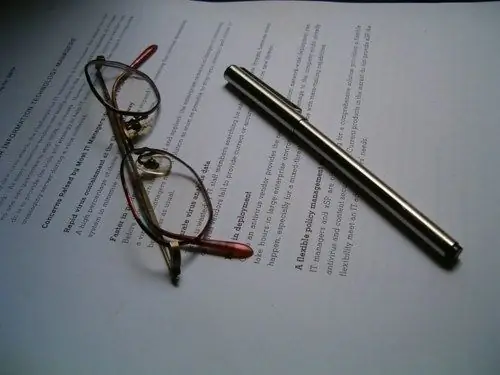- Author Maria Gibbs gibbs@autolifeadvice.com.
- Public 2023-12-16 03:05.
- Last modified 2025-01-22 17:48.
If you buy or sell a used car, you need to go through the process of re-registering it. It is possible to transfer the rights to a vehicle to another person under a sale and purchase agreement, by donation or exchange, as well as by way of inheritance and division of property.

It is necessary
vehicle passport, seller's passport, buyer's passport, power of attorney, vehicle registration certificate
Instructions
Step 1
Carry out the purchase and sale procedure. The main document in this transaction is the contract. It is better to notarize it. Keep in mind that the contract is drawn up in the prescribed form and must contain information about the buyer and the seller, as well as about the subject of the transaction. Make sure that the re-registration is carried out correctly, with the drawing up of an act of acceptance and transfer of the car. Read the vehicle information carefully. Pay attention to the nuances that may occur when re-registering a foreign-made car. Better if they are already registered with the traffic police.
Step 2
Go through the procedure for obtaining ownership of the car in the order of inheritance. Here the main document is a certificate of the right to inheritance. Remember that you will need to show a copy of the vehicle owner's death certificate. Then the car is removed from the register and, on the basis of the certificate of the right to inheritance, it is registered in the name of the heir. If the car is reissued by a third party, a power of attorney is required, notarized and containing information about the powers of the authorized person. This list must have the right to deregister and register with the traffic police.
Step 3
Re-register the car using a power of attorney. You can issue or receive a power of attorney only for certain actions, such as deregistering a car, selling it, representing the interests of the owner at a technical inspection. The seller continues to be the owner of the car, he is fully responsible for what happens to him. Also, the seller is not released from the obligation to pay fines and compensation for damage caused by the vehicle. The buyer does not become the owner of the vehicle. He can only perform those actions that are spelled out in the power of attorney, for example, manage it, carry out a technical inspection and pay fines. The owner has the right to revoke the power of attorney at any time, then the buyer will lose the right to drive the car. If the death of the owner occurs, the power of attorney will lose its validity and the right of ownership will belong to the heirs by law.






